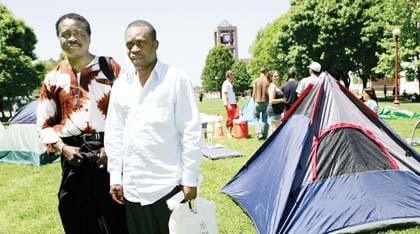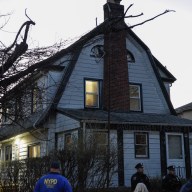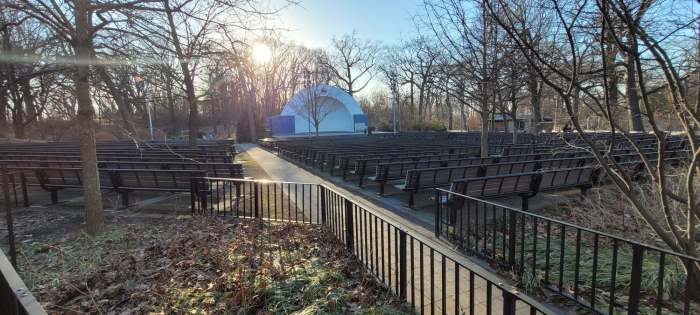By Anna Gustafson
Yaa−Lengi Ngemi and Rashidi Mubwana know all too well what war means.
For the two former Congolese citizens, it means they cannot return to their home. It means family being forced to live in refugee camps for years before going back to the Democratic Republic of Congo. There, friends and family live in constant fear in a country where political unrest and civil war has killed more than 5 million people, almost half of them under age 5, according to the International Rescue Committee.
Ngemi and Mubwana, both of whom now live in Manhattan, spoke to Queens College students who were trying to raise awareness about genocide by erecting a simulated refugee camp on the school’s quad last week.
“Regular people can make a difference in stopping genocide,” said Ngemi, a professor at the College of New Rochelle who is writing a book about the current political situation in the Congo. “You need to get in touch with the politicians, with the presidents of colleges, you need to do things like what these students are doing.”
More than a dozen Queens College students lived for five days in makeshift tents and with provisions they could fit into a backpack to bring attention to the violence, genocide, rape, starvation and other conditions faced by people in the Congo as well as by the displaced individuals of Darfur in western Sudan.
More than 300,000 people have been killed in Darfur since a civil war broke out in 2003 and millions have been displaced, according to the United Nations.
Mubwana, who was granted political asylum by the United States in 1998, said his mother had to flee from the Congo to a refugee camp in Tanzania for years. She only recently returned to an area in the Congo, which Mubwana would not specify for fear of her being killed.
“Friends and families are struggling,” said Ngemi. “People are dying of hunger. Anyone who speaks up in the Congo, you are dead.”
Student organizers Jennifer Polish, a sophomore, and Doug Leresche, a junior, said they wanted to hold the “REFUGEE CAMPus” project last week because nearly all of Queens College’s 20,000 students would be passing by the quad to get to and from their final exams.
The move worked, and Polish, who grew up in Bayside, said numerous students had stopped by the tents to learn more about the genocides.
“In addition to making tangible change to genocide, we want to inform people that activism is not an abstract concept,” Polish said. “This is not just something that happened in the ’60s. Activism works.”
Leresche, who is from Zimbabwe, said he wanted to motivate students to think about things beyond their immediate lives, even during the stress of finals week.
“It would be nice if students came together a little more and realized there’s a whole world to worry about,” said Leresche, whose parents live in South Africa. “I wanted to raise awareness about the world and get people involved.”
A bevy of officials and activists spoke to the students during the week−long event, and the organizers kicked off the project with speeches from Queens College President James Muyskens; 1960s civil rights activist Mark Levy, a Queens College alumnus; and co−founder of the NYC Coalition for Darfur Sharon Silber.
Reach reporter Anna Gustafson by e−mail at agustafson@cnglocal.com or by phone at 718−229−0300, Ext. 174.

































